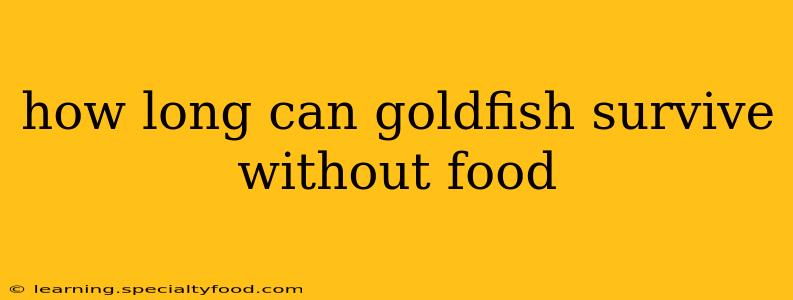Goldfish are beloved pets known for their resilience and relatively low-maintenance care. However, even these hardy creatures have limits, and one common question among goldfish owners is: how long can they survive without food? The answer, unfortunately, isn't a simple number. Several factors influence a goldfish's survival time without food, making it crucial to understand these variables to ensure the health and well-being of your finned friends.
What Factors Influence How Long a Goldfish Can Go Without Food?
Several key factors significantly impact how long a goldfish can survive without food:
- Species: Different goldfish species have varying metabolisms. Common goldfish (Carassius auratus) generally have a slower metabolism than more active breeds, meaning they can withstand longer periods without food.
- Water Temperature: Colder water slows a goldfish's metabolism, allowing them to survive longer without food. Warmer water speeds up their metabolism, increasing their need for sustenance.
- Fish Size and Age: Larger, adult goldfish have more energy reserves than smaller, younger fish. Consequently, larger goldfish can typically go longer without food.
- Water Quality: Poor water quality accelerates the depletion of a goldfish's energy reserves. Clean, well-oxygenated water is crucial for survival, especially during periods without feeding.
- Overall Health: A healthy goldfish with a robust immune system will be better equipped to handle periods without food than a fish already suffering from illness or stress.
How Long Can a Goldfish Survive Without Food? A Realistic Timeline
While there's no definitive answer, a healthy adult goldfish in ideal conditions can potentially survive for several weeks without food. However, this is not ideal, and it's crucial to avoid letting this happen. After a couple of weeks, you'll likely notice a decline in their health and activity levels.
For smaller goldfish or those in less-than-ideal conditions, the survival time could be significantly shorter—a week or even less.
What Happens to Goldfish When They Don't Eat?
When deprived of food, a goldfish's body begins to metabolize its stored energy reserves. This initially affects their activity levels; they become less active and less responsive. As the period without food extends, their immune system weakens, making them more vulnerable to disease. Severe starvation can lead to organ damage and ultimately death.
How Often Should You Feed Your Goldfish?
To prevent starvation and maintain their health, feed your goldfish according to their needs. A general guideline is to feed them only what they can consume within a few minutes. Overfeeding is just as harmful as underfeeding and can lead to water quality issues.
Can Goldfish Go Without Food for a Short Trip?
If you're going away for a short period (a weekend, for example), you might be able to leave your goldfish without feeding, especially if they are adult, healthy fish in good water conditions. However, it's always best to have someone check on them and ensure their water is clean. Consider using an automatic feeder if you'll be gone for a longer duration.
What are the Signs of a Starving Goldfish?
Observe your goldfish carefully for any signs of starvation. These include:
- Lethargy: Reduced activity and responsiveness.
- Weight Loss: A noticeable decrease in body size.
- Loss of Color: Fading or dulling of their scales.
- Listlessness: Appearing weak and unable to swim normally.
- Loss of Appetite: Even when offered food, they may show no interest.
My Goldfish Didn't Eat for a Week - Should I Be Worried?
If your goldfish hasn't eaten for a week, it's definitely cause for concern. Monitor their behavior closely for signs of starvation and consult a veterinarian specializing in aquatic animals if you notice any alarming symptoms.
Conclusion
While goldfish possess a remarkable ability to survive periods without food, it's crucial to remember that this is not ideal and should be avoided. Regular feeding, maintaining excellent water quality, and careful observation are essential for ensuring the long-term health and well-being of your goldfish. Preventing starvation is always better than dealing with its consequences.
